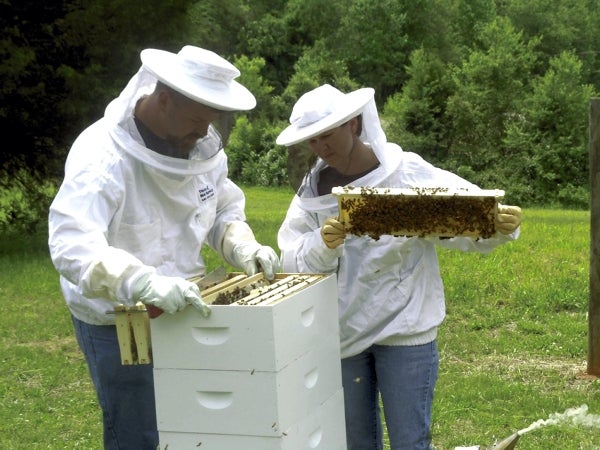Save the bees — become a beekeeper
Published 12:00 am Friday, January 6, 2017

- Submitted photo Jennifer and Ben Rosecrans work their bee hive. A beekeeping course starts Jan. 17 at Cooperative Extension.
By Amy-Lynn Albertson
Rowan County Extension Director
Honey bees are an amazing insect that man began hiving more than 3,000 years ago. Bees collect nectar and pollen for food, and in the process they pollinate many trees and wildflowers.
These products are brought back into the hive and stored in cells that are remarkably designed for strength and space. They are made out of the nectar that is converted to wax by glands on the body of the bee. A third of the food we consume is thanks to the honey bee.
Pollination alone is reason enough to keep bees. It’s one of greenest things you can do. The rewards of beekeeping extend beyond honey and pollination. Bees produce other products that can be harvested and put to good use.
Propolis is a sticky resinous material that bees produce by mixing saliva and beeswax with sap gathered from trees and plants that have a lot of antibacterial properties. Even the pollen they bring back to the hive can be harvested. It’s rich in protein and makes a healthy food supplement in our own diets.
Millions of colonies of wild honey bees have been wiped out by urbanization, pesticides and parasitic mites. When gardeners wonder why they don’t see very many honey bees in their gardens, it’s because of the dramatic decrease in our wild honey bee population. Backyard beekeeping has become vital to efforts to reestablish lost colonies of bees and offset the decrease in pollination by wild bees.
Many beekeepers find that tending bees is calming and helps to relieve stress. As a beekeeper you will discover lots of new things about nature, bees and social behavior.
The Rowan County Beekeepers Association is offering a Beginner’s Beekeeping School, 7-9 p.m., Tuesdays, Jan. 17-March 21. This school is nine sessions and costs $60/person. The cost of the course covers all materials, a beginning beekeeping book, and an Apiary Field Day.
For more information about the Beginner’s Beekeeping School, please call the Rowan County Extension Center at 704-216-8970 or on the web at http://rowan.ces.ncsu.edu




